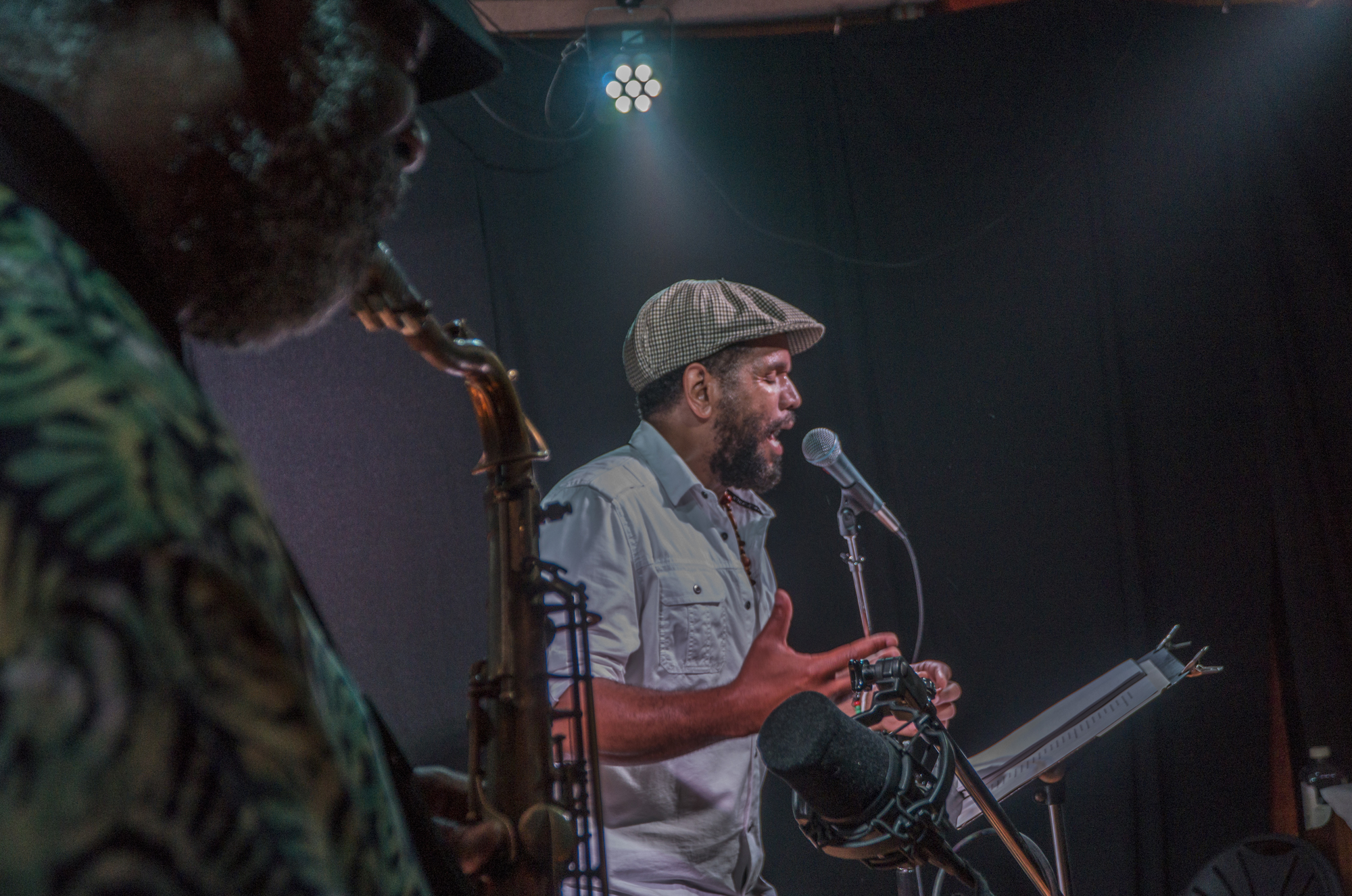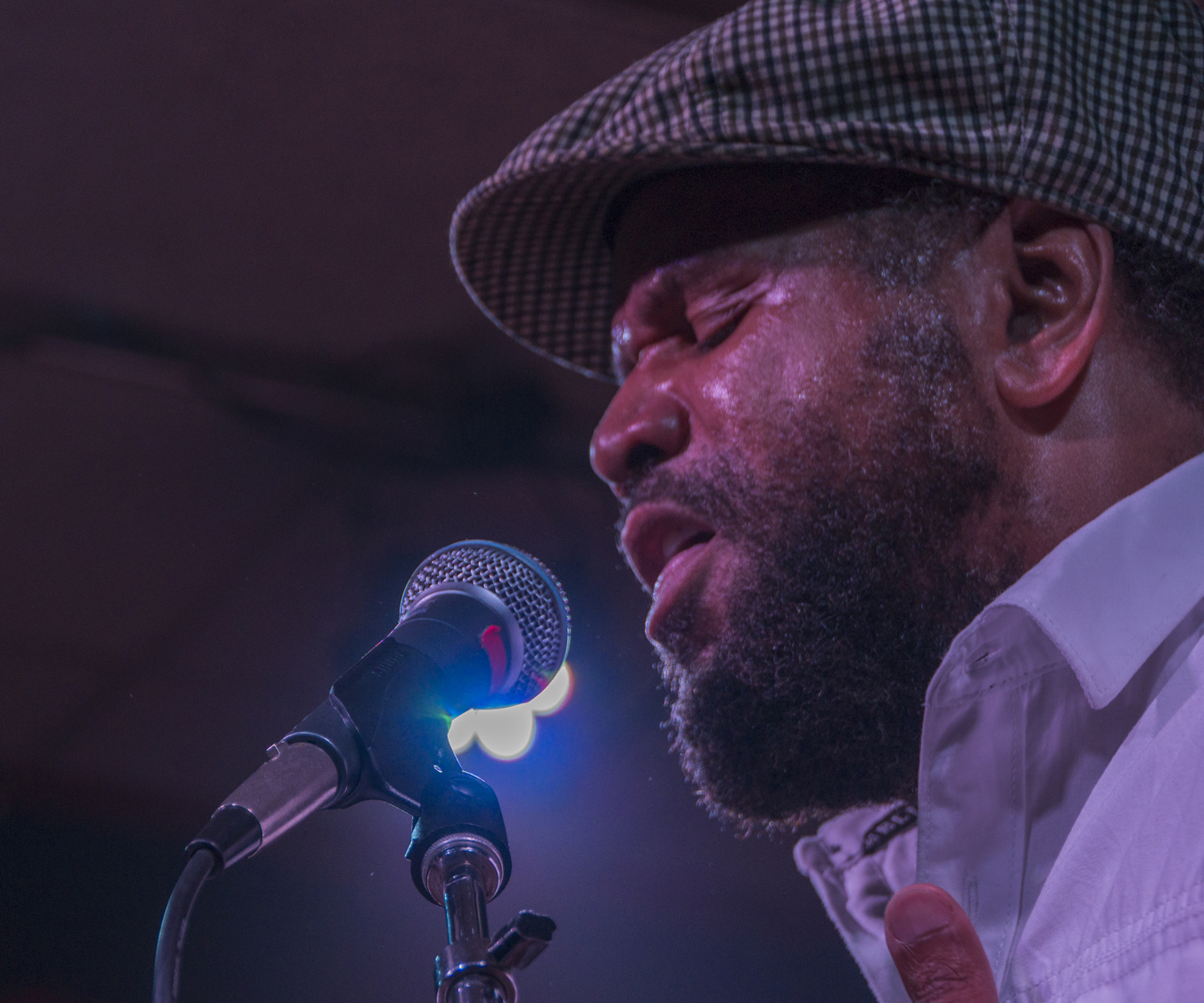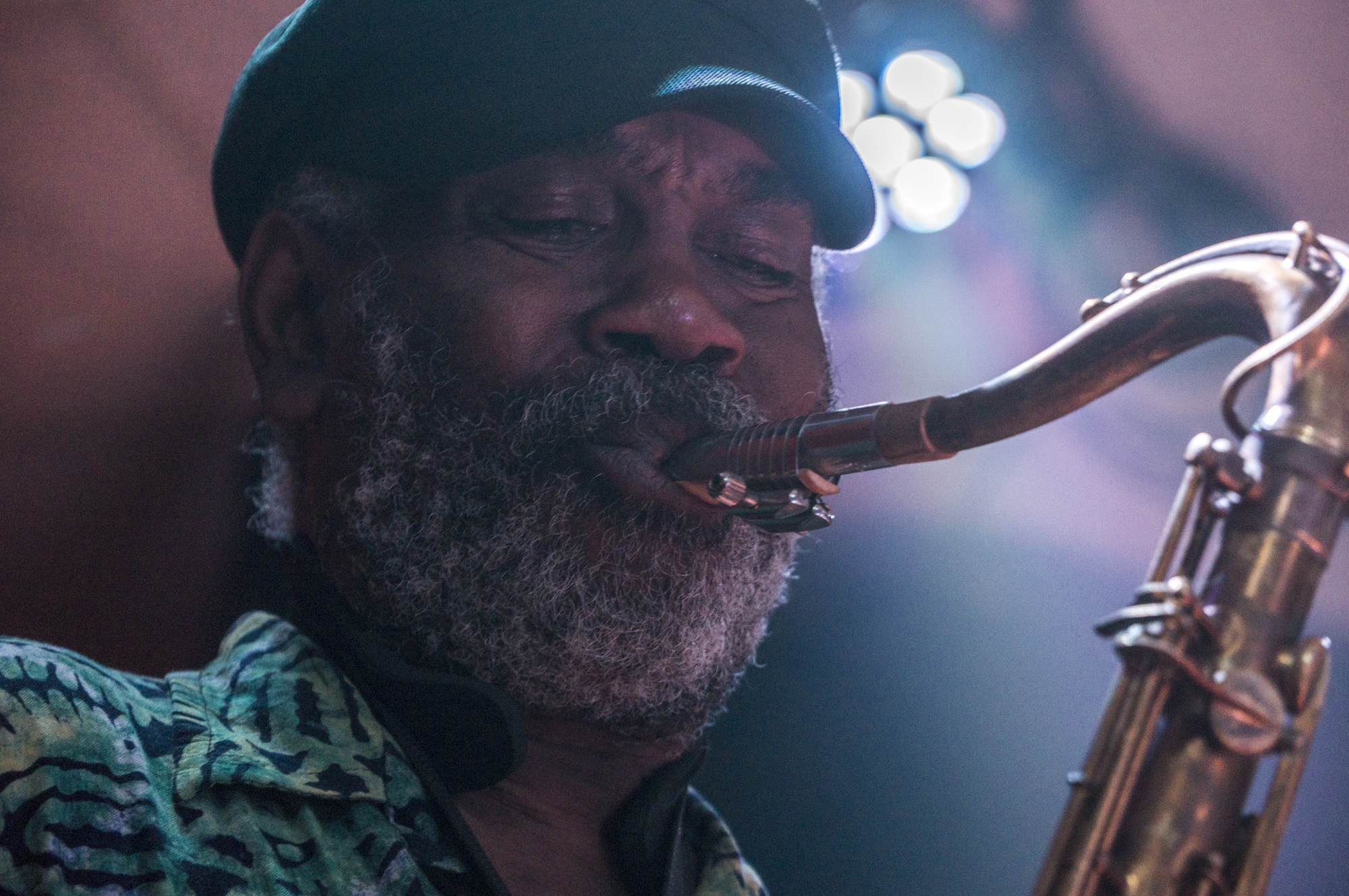Spoken word poet Lasana Kazembe raised an unsuspecting bottle of water. “Let us pour a libation to sister Zora Neale Hurston—ashe!” The audience at Transition East Studio, an independent audiovisual production space in South Chicago, echoed his invocation with its own affirmative “Ashe!”
Kazembe prefaced the night’s performance, a blues opera entitled The Voodoo of Hell’s Half-Acre, with what he described as a customary African invocation of ancestral figures. Kazembe’s opera was based on the decade that writer Richard Wright spent in the city of Chicago, and his opening prayer set up a key theme for the work. Kazembe ran through a list of resonant presences, some historical—like Frederick Douglass and Harriet Tubman—and others more contemporary. “Ashe” (pronounced “ah-shay”) was a kind of confirming “amen.”
In soliciting the strength of ages past, Kazembe summoned the concept of the definitive, black utterance. Voodoo confirmed that orality is a powerful, fitting, and worthy engine for expressing cultural watersheds in the African diaspora. While nodding affirmatively at spoken word as a medium, his opera channeled and charted Wright’s spiritual growth in Chicago’s vibrant cityscape.
Voodoo consisted of six thematic poem performances and several musical interludes, spanning about an hour and twenty minutes and broken into five acts. Kazembe’s evocative recitations acted upon the listener’s imagination; blues colored and molded the ensuing thoughts, giving an elaborative sonic structure to the spoken word. Kazembe had partnered with three musicians: Yosef Ben Israel on upright bass; Enoch Williamson on shakare, chimes, and several drums; and Eliel Sherman Storey, proprietor of Transition East, on two different saxophones.

Named after a lost short story Wright had published in the Southern Review at age fifteen, the blues opera was conceived as a part of the ongoing Chicago Artists Month. Kazembe hopes that after the first four pilot performances of Voodoo—of which this night’s was the third—he can bring the show across the city and to progressively larger venues.
“We were supposed to have some sisters up here doing double-dutch,” he explained to the room afterwards. “Another doing a painting.” Bigger spaces would mean more performers, and a chance to realize the multimedia choreography Kazembe had initially built into Voodoo’s overarching structure.
In the show, Kazembe framed Richard Wright as a personal hero and source of inspiration. Wright, the creator of works such as Native Son, Black Boy, and The Man Who Was Almost a Man, migrated north to Chicago in 1927, eventually leaving for New York in 1937. Wright was a postal clerk by day and a restless writer by night. Voodoo attempts to give a shape and form to the kind of psychic education the author got from a decade here while coming of age.
Despite its historical content, Voodoo doesn’t suppose a tidy break between the lived experience of Kazembe on the one hand and Wright on the other. Kazembe’s first act takes the audience back to a southern railroad depot, in the company of crickets, waiting for that “1am boat-train” to come. Kazembe’s a capella blending of the engine’s rumble (“katcha-katcha-katcha”) with a present-day El clattering overhead (“kata-kata-kata”) puts these two different vehicles for an emotional journey on a same-track collision course.
Every now and then the opera explodes into a cloud of loosely coordinated anecdotes. Over the performance, Kazembe creates a joint reality—vibrant, seemingly still-living Wright “haggles with James Crow behind” a present-day “cut-rate store.” The Lewis guns of twenties-era crooked cops inspire the same outrage as traffic officers who “just ain’t killing to be killing,” but figure “there must be something in the melanin” that makes black men bullet magnets. Kazembe’s Wright encountered a “sick body politic,” a rotten “corpus delecti,” as deceitful and dishonest yesterday as today.
The affecting sights that Kazembe speaks into being transfix the listener, as well as the fictive Wright. Kazembe’s Wright is captivated by the physical mechanics of moving women, where “u is the initial velocity and a is the acceleration and x is miles—miles of smiles!” He conjures up young boys who “liberated potential dishwater from fire hydrants.” The third act’s poem, “Freedom Summer,” permutes the classic jump-rope cadence “Miss Mary Mack, Mack, Mack is dressed in black, black, black” into a potential takeaway for Wright’s time in Chicago: “Be young, beautiful, and black, black, black.”
This jumble and crush of observations turns into a pressing desire to talk and narrate. In the second act, Kazembe switches out of the loud, chest-clenching register of spoken word. He breaks into a breathless whisper, and turns to the musicians excitedly.
“Shush, guys, don’t play so loud,” he insists. “I got to tell them about this part! Shush! I got to, I got to tell them about this part.”
With this gesture, Voodoo makes a biographical argument about Wright. Although Wright may have written his greatest works in New York, he stored up a kind of spiritual soul food from the South Side. What Wright saw stirred him to action, and compelled him to write unique works that could contain this knowledge of his heritage as literature hadn’t before. Kazembe elaborated on Wright’s literary experiments after the show, stating that Wright had been influenced by a range of authors, even Shakespeare: “Shakespeare was just telling his own folk story.”

Coming from the direction of a folk ethos, Kazembe’s insistence on calling Voodoo a blues opera seems strategic. A spoken word performance can capture the spirit of a grand historical moment—this birth of an artist—just as deftly as the Western European tradition we usually call “opera.” Animating the spoken word libretto with bass, sax, and African percussion highlights how spoken word is a rigorous vocal training in its own right. The slow evolution of a blues standards motif beneath Kazembe’s voice throws into relief his rhythm and beat, his measured enunciation—his long -s’s and emphatic plosives. The opera’s saxophone solos gesture to areas of ineffability, moments where Kazembe has to step down and see if Eliel Storey’s playing can finish the thought he started.
The Voodoo of Hell’s Half-Acre fits itself into the tradition of Kazembe’s opening invocation. Kazembe takes an ancient orality in the context of the present and starts to develop a vision of the future, where Wright’s learning—and Kazembe’s own growing up—can be understood and treasured by everyone in an authentic, African register. The historical Wright grappled with deeply embedded cultural phenomena that white authors couldn’t ever conceive. Kazembe himself is trying to articulate the timeless virtues of a black Chicago through an operatic form that’s true to the heritage he stakes out in his ancestral prayer. Voodoo helps us lucidly imagine what it might mean for an older, wiser Wright to take stock of his experiences whilst waiting on another train platform, bound for New York.
“Chi-ca-go,” Kazembe cries, repeating himself, lost in thought. “It’s black, it’s bitter, it’s sweet. Black, it’s bitter and sweet. Chicago’s black bittersweet memories.”


Hands down, one of the most enlightening and invigorating performances I’ve ever attended. Kazembe is “mind blowingly” gifted and was able to bring Wright’s sentiments of Chicago to life that evening…I look forward to supporting more of Kazembe’s works.
I love that someone is giving and making the knowledge available..